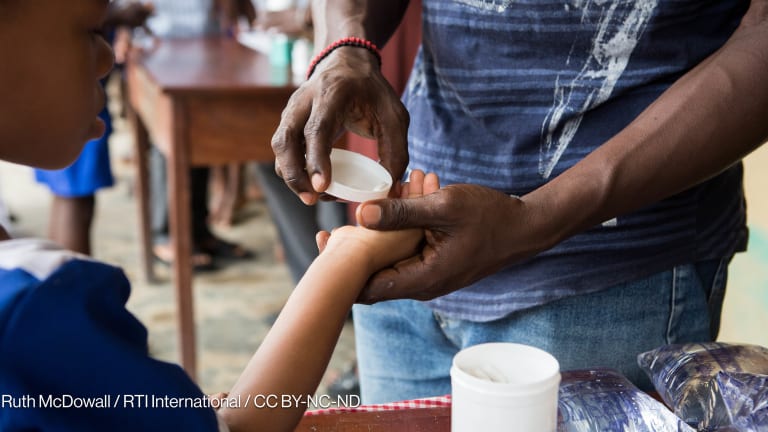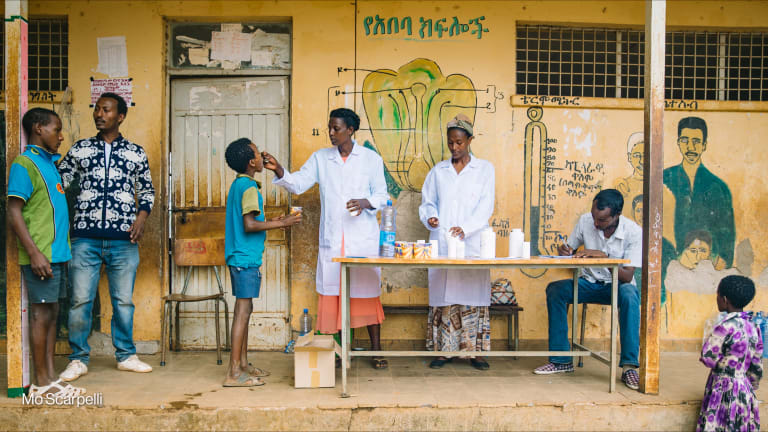How to continue the fight against NTDs amid the pandemic
Continue activities, make up for missed treatment, consider how neglected tropical diseases can be mainstreamed in health systems, and innovate, advises RTI International's Jeremiah Ngondi.
If gains made tackling neglected tropical diseases are not to be lost, the sector must continue programming amid the COVID-19 pandemic and find ways to make up for missed or delayed treatment, Dr. Jeremiah Ngondi, senior NTD adviser for the U.S. Agency for International Development’s Act to End Neglected Tropical Diseases East program at RTI International, told Devex in an interview. Otherwise, NTDs stand to become further neglected. Affecting more than 1.7 billion people worldwide, NTDs are a group of 20 communicable diseases — including leprosy, lymphatic filariasis, and visceral leishmaniasis — that, despite often being preventable, have debilitating and sometimes fatal consequences. At the start of the pandemic, the World Health Organization had recommended postponing community-based surveys for NTDs, active case-finding activities, and mass treatment campaigns. It has since provided a decision-making framework to help determine whether an NTD activity should proceed. But instead of delaying screening and treatment, Ngondi said the sector should be coming up with unique ways to continue programming. “We need to understand that skipping activities has huge impacts in the short term. It might seem like an inconvenience in terms of planning programs, but when you look at the knock-on effect of those delays, it could actually push back programs.” “We may not have all the answers, but the NTD community is very innovative.” --— Dr. Jeremiah Ngondi, senior NTD adviser, RTI International Today, 600 million fewer people are at risk of NTDs than a decade ago and 42 countries have eliminated at least one NTD. But according to the NTD Modelling Consortium, a disruption in activities could mean a decline in the detection of NTDs and an increase in the underlying rate of new infections. For example, data shows a year’s suspension of programming could push progress back for visceral leishmaniasis — a parasitic disease caused by sand flies that can often be fatal — by between one and five years in the Indian subcontinent. “The challenge here is that with these diseases, if you stop the treatment [they] tend to resurge, and therefore you'll be playing catch-up further down the line,” Ngondi said. With WHO’s new NTD road map setting targets for the significant reduction and elimination of certain NTDs by 2030, “playing catch-up” is not something the NTD community has time for. Other knock-on effects of program delays include the potential expiration of medicines earmarked for 2020 mass drug administration campaigns — which are used to fight lymphatic filariasis, onchocerciasis, schistosomiasis, soil-transmitted helminths, and trachoma — while the halting of community surveillance means a lack of information on the amount of drugs needed for 2021. Ngondi called for the sector to focus on continuing activities, to think more broadly about how to make up for missed or delayed treatment, to use the challenge of the current crisis to understand how NTDs can be mainstreamed into the health system, and to innovate. “We may not have all the answers, but the NTD community is very innovative. And we need to … keep innovating [and] share ideas so that these innovations and approaches [can be] implemented across the board,” he said, citing his own invention integrating loupes with a face shield as an example. Piloted in the Democratic Republic of Congo, the face shield has built-in magnifying glasses that allow a health worker — while also wearing a face mask — to get close enough to a patient to check for trachoma by looking under the eyelids. The shield is set to be rolled out in Mozambique, Uganda, Tanzania, and Ethiopia. “There are other countries which have even gone a step ahead and decided that surveyors … need a negative COVID test [before] traveling to the field,” Ngondi said. Other unique yet simple ways of continuing NTD programs amid the pandemic include shifting from mass drug administration at a central site to a house-by-house approach, using chalk to mark a wall so that a child may have their height measured for determining dosage from a distance, conducting pre-transmission and transmission assessment surveys outdoors, and assigning time slots to community members for examinations. The pandemic may be the new normal, so the sooner some of these initiatives can be adopted, the better, Ngondi said, adding that COVID-19 has provided the NTD community with a good opportunity to start rethinking approaches. The sector has long been calling for NTD diagnosis and care to be better integrated into health systems. And the new WHO road map highlights the need to move from vertical disease programs to cross-cutting approaches, factoring in environmental determinants of health such as water, sanitation, and hygiene; nutrition; and education. Better integration would mean that for any future pandemics, NTDs “will already be in the DNA of how the health systems are formed and they won't be neglected,” Ngondi said. “For some of the countries which are really at the endgame — maybe a couple of years or a year or two from meeting their targets — then it means that they will not be able to celebrate and pop the champagne of success because of the delays.”
If gains made tackling neglected tropical diseases are not to be lost, the sector must continue programming amid the COVID-19 pandemic and find ways to make up for missed or delayed treatment, Dr. Jeremiah Ngondi, senior NTD adviser for the U.S. Agency for International Development’s Act to End Neglected Tropical Diseases East program at RTI International, told Devex in an interview. Otherwise, NTDs stand to become further neglected.
Affecting more than 1.7 billion people worldwide, NTDs are a group of 20 communicable diseases — including leprosy, lymphatic filariasis, and visceral leishmaniasis — that, despite often being preventable, have debilitating and sometimes fatal consequences.
At the start of the pandemic, the World Health Organization had recommended postponing community-based surveys for NTDs, active case-finding activities, and mass treatment campaigns. It has since provided a decision-making framework to help determine whether an NTD activity should proceed.
This story is forDevex Promembers
Unlock this story now with a 15-day free trial of Devex Pro.
With a Devex Pro subscription you'll get access to deeper analysis and exclusive insights from our reporters and analysts.
Start my free trialRequest a group subscription Printing articles to share with others is a breach of our terms and conditions and copyright policy. Please use the sharing options on the left side of the article. Devex Pro members may share up to 10 articles per month using the Pro share tool ( ).
Rebecca L. Root is a freelance reporter for Devex based in Bangkok. Previously senior associate & reporter, she produced news stories, video, and podcasts as well as partnership content. She has a background in finance, travel, and global development journalism and has written for a variety of publications while living and working in Bangkok, New York, London, and Barcelona.








